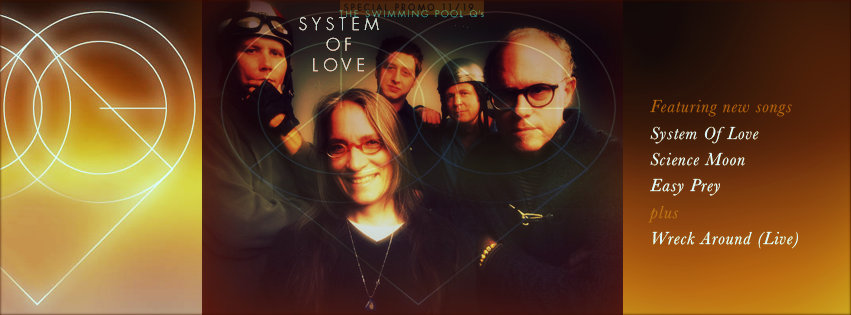System of Love EP by The Swimming Pool Q's- MP3 Album
Jeff Calder's Personal Archive > LaFayette of the Lighted Floor, 1978 (1) > Cerrone

In general, the subject of this piece comes off rather better than its author. It’s a mostly unremarkable story, save for the preposterous title, the first in a series of failed “French” gags. For some reason, my kind editor at The Tampa Tribune, Mike Kilgore, seemed desperate for me to interview Cerrone, about whom I knew nothing. My lack of interest doubtless accounts for its petulant tone.
At that time I held the prejudice against disco shared by many in the American New Wave & Punk crowd. I’d like to think that last-minute editing by the staff might explain the article’s insufficient brief for a discrepancy in Cerrrone’s thinking, but there was probably not that much insight on the writer’s part in the first place. Since Bob Elsey and I were recording our first demos for The Swimming Pool Q’s in Lakeland at that moment, and I would move to Atlanta less than a month later, this is probably one of my last articles for the Currents weekend insert of The Tampa Tribune. It’s interesting to note that Chrissie Hynde appears on Supernature.
Tampa Tribune
Friday, February 17, 1978
There he is at Tampa International, frosted black hair being tossed in the wind. Cerrone is probably the biggest male disco star of the moment, selling six million records in Europe, smashing Donna Summer off Yankee disco charts. He even performs with a 60-piece orchestra.
Unlike most of the rest of the music industry, disco is tailored to anonymity and interchangeable parts. The idolatry is all on the dance floor.
That’s not to say Cerrone hasn’t made his mark. Supernature, his first American release, has established the producer/percussionist in the fly-by-night disco business.
The album’s sick cover has repelled thousands to the cash register. The title cut is like a dance version of The Exorcist theme.
Cerrone (pronounced Sir-own) detests the word “disco.” Of course, Supernature is nothing if not disco effervescence. It’s a compliment to say the record sounds like every other disco release. The key to the formula is sameness.
Yet, in the patio sun, Cerrone is easily distinguished from his American cohorts. In their blunt-toed boots, honchos from the local Disco Pool are dialing “3” for Amaretto. By contrast to their vests and jeans, Cerrone is wearing a three-piece suit; over his arm, a fur coat. A strand of gold links circles his neck, crosses his chest.

Cerrone is poised over a club sandwich and a plastic-footed cone of pilsener. With his struggling mustache and protruding teeth, the French star looks like a handsome squirrel. He’s not in the states to perform, just for a bit of self-promotion—perhaps to pave the way for that 60-piece orchestra.
Alan Wisnaik, Cerrone’s co-writer, does the translating. We go over the background. Cerrone “went solo” and hit with “Love in C-Minor”. The stateside cash-in was stalled by other performers’ cover versions of his songs. Import foul-ups foundered the second LP, Paradise. Shrewdly, Cerrone arranged to have Cotillion release Supernature in America first.

Supernature ’s cover depicts Cerrone in an operating room. On the cutting table is an artificial anatomy model. At Cerrone’s feet is the model’s excised plastic heart. Beneath the operating table are three men in hog masks.
Cerrone explains, “The original [album] cover opens to show Paradise with Adam and Eve. I did want to show Good and Wrong. You could see Wrong as you watch the cover, Good as you open it.”
Supernature ’s theme is a favorite H.G. Wells’ device. Science tampers with the natural order by feeding a potion to some “creatures down below.” The mutants run amok. Strewn behind them is much death. The moral: “Maybe nature has a plan/To control the ways of man/He must stop his tragic game/Till he ears his place on earth/Like the other creatures do.”
Oui. Science perverts mankind. How then does Cerrone face the contradiction of using technology to produce his record, thereby earning his “place on earth”?
“Very good question,” says Cerrone, tipping his pilsener and doubling his mustache with foam.
Other lines of inquiry prove even more difficult. Incoming planes nag at the conversation. I probe; Alan translates. Cerrone parries in lengthy French, allowing Alan to deliver the coup de grace in English: “No.”
Certain details emerge, all trivial. Cerrone produces several disco acts. He likes the Doobie Brothers. He does not believe in hypnotism. When Cerrone arrived in Los Angeles to tape an American Bandstand segment, the first thing he did was go to McDonalds.
Eyeing Cerrone’s booty*, I’m about to ask what it’s like to be French. Suddenly, a jet gust knocks over his beer. The plastic base and cone fall in two, perfectly guillotined. Cerrone gets a real kick out of this.
*A short boot with a pull-on loop.






